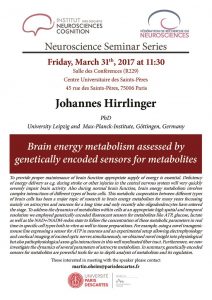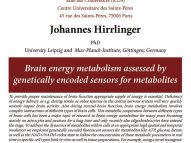 Neuroscience Seminar Series:
Neuroscience Seminar Series:
Friday, March 31th, 2017 , 11:30 am, Salle des Conférences (R229), Centre Universitaire des Saints-Pères, 45 rue des Saints-Pères, 75006 Paris
IMPORTANT NOTE: STARTING THIS WEEK WE WILL HAVE DRINKS AND CANAPÉS AFTER THE SEMINAR TO OFFER SCIENTISTS THE OPPORTUNITY TO DISCUSS TOGETHER! YOU ARE ALL INVITED.
Dr. Johannes Hirrlinger (Professor, Carl-Ludwig-Institut for Physiology -University Leipzig – Leipzig – Germany).
Title:
Brain energy metabolism assessed by genetically encoded sensors for metabolites.
Summary:
To provide proper maintenance of brain function appropriate supply of energy is essential. Deficiency of energy delivery as e.g. during stroke or other injuries in the central nervous system will very quickly severely impair brain activity. Also during normal brain function, brain energy metabolism involves complex interactions of different types of brain cells. This metabolic cooperation between different types of brain cells has been a major topic of research in brain energy metabolism for many years focussing mainly on astrocytes and neurons for a long time and only recently also oligodendrocytes have entered the stage. To address the dynamics of metabolites within cells at an appropriate high spatial and temporal resolution we employed genetically encoded fluorescent sensors for metabolites like ATP, glucose, lactate as well as the NAD+/NADH-redox state to follow the concentration of these metabolic parameters in real time in specific cell types both in vitro as well in tissue preparations. For example, using a novel transgenic mouse line expressing a sensor for ATP in neurons and an experimental setup allowing electrophysiology and confocal imaging of excised optic nerves simultaneously, we obtained novel insight into physiological but also pathophysiological axon-glia interactions in this well myelinated fiber tract. Furthermore, we now investigate the dynamics of several parameters of astrocyte metabolism. In summary, genetically encoded sensors for metabolites are powerful tools for an in depth analysis of metabolism and its regulation.
Those interested in meeting with the speaker please contact Martin Oheim.
